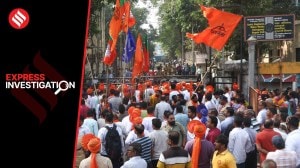Umpires are human, too
India must stop blaming umpires every time a cricket match is lost. Doubtless those standing in the second Test match had poor games but the...

India must stop blaming umpires every time a cricket match is lost. Doubtless those standing in the second Test match had poor games but the visitors must take full responsibility for their defeat. Rahul Dravid and his men lost the match on the first day. A powerful batting order failed to score 300 runs against an underestimated Pakistani attack. It is as simple as that. Thereafter the Indians were trying to claw their way back into the match, never the easiest of tasks.
Always there is a temptation to search for some dubious reason to explain a heavy defeat. Indian supporters are daily exposed to the corruption of those in power and inevitably cynicism sets in. Accordingly these is a tendency to forget that cricket matches have waxed and waned since the game began, and that sport cannot be reduced to cause and effect as if it were an experiment in a laboratory. Rather it is subject to the whims and moods of the players, the men whose imperfect skills and unconquered minds drive the contest along.
Moreover matches have a momentum about them. Doubtless umpires respond to the mood, reinforcing rather than reversing trends. Such is human nature. Consequently the hardest task in cricket is to change the direction of a contest because subconscious forces conspire to reinforce the status quo.
Every true sportsman knows and understands the capricious nature of their activity but unexpected defeat continues to provoke an emotional reaction with insufficient credit given to the victorious side. Often jiggery-pokery is suspected, with the integrity of umpires, captains and players called into question.
Considering the recent history of the game and the amount at stake in these matches this critical examination is not altogether surprising. But sport was unpredictable and umpires needed white sticks and hearing aides long before the bookies started throwing their money around.
There is not the slightest reason to suggest that these umpires were not acting to the best of their ability. Simon Taufel is an inexperienced but promising newcomer whose integrity is not in doubt. Steve Bucknor is a seasoned campaigner widely respected wherever the game is played. My main quibble with Bucknor is that he is fussy and reluctant to give decisions, an approach encouraged by the scrutiny that awaits every raised finger.
Neither man is infallible. Taufel has had his ups and downs but his sincerity is manifest. Bucknor8217;s leg-before decision against Sachin Tendulkar in Brisbane was mistaken. On the other hand, he had an outstanding match in Colombo before flying to Pakistan.
Not that umpires are beyond criticism; they have been compromised before now. Others are incompetent. Asoka De Silva has been the least impressive of the current elite group with Darrell Harper not far behind. But they must be given the same benefit of the doubt bestowed upon batsmen. Bucknor and Taufel are trying to reach the correct decisions while under relentless pressure, fierce scrutiny and with players appealing raucously and sometimes deplorably amidst the deafening noise of the stadium.
Rather than condemning Bucknor and company, steps must be taken to assist them so that injustices are avoided. Umpires are standing in too many matches. More must be appointed so that they remain fresh. Retirement must be compulsory when a certain age has been reached because the senses deteriorate as the years go by. Technology must be used whenever it can be relied upon.
Otherwise India should not dwell upon the errors of honest men. Instead Ganguly and colleagues should focus upon their own mistakes so that they are not repeated in the third act of a compelling drama.
Cricket News
- 01
- 02
- 03
- 04
- 05































